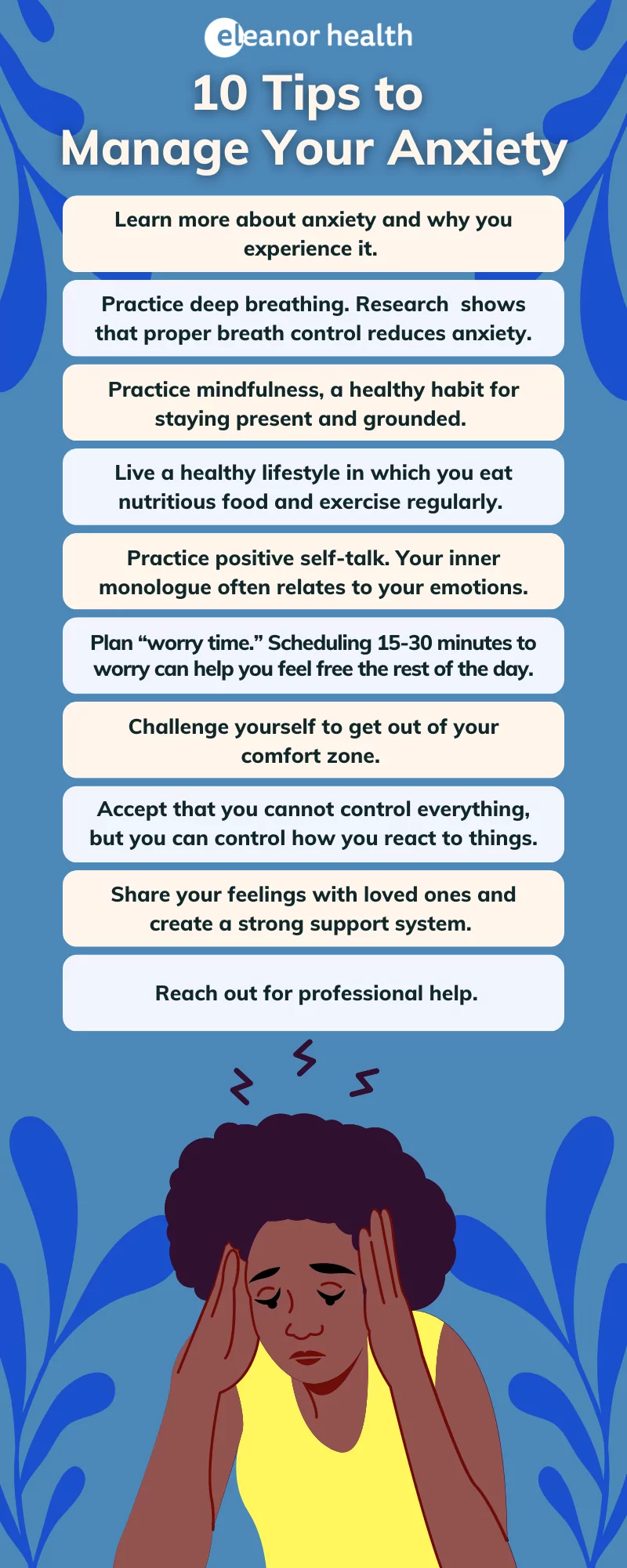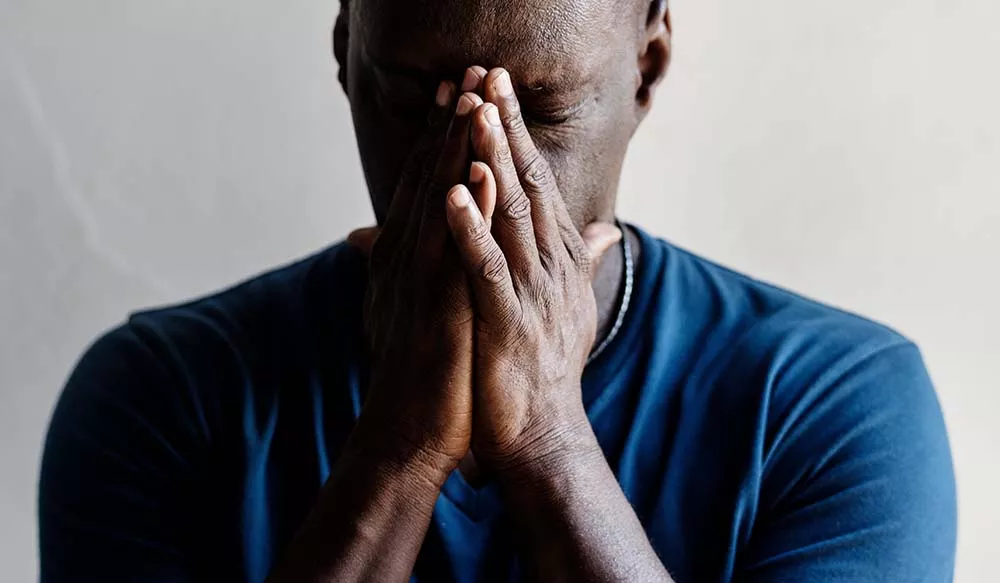At some point or another, anxiety gets the best of everyone. Feeling anxious before stressful events or because of large responsibilities is entirely normal. However, when anxiety becomes persistent and overwhelming, it can become a burden in your life. When anxiety becomes so tenacious that it begins interfering with your daily tasks and mood, it starts presenting as a problem. Although there is no foolproof way to get rid of anxiety altogether, one thing is for sure: there are tactics you can use to manage your anxiety better and improve it in the long run.
Anxiety is a natural, normal, and healthy feeling. It derives from our innate human response to potential dangers. Anxiety developed as a survival instinct during early human history. Some call this our “caveman response” to potential threats. Nowadays, we are more likely to feel anxiety before an exam or job interview than while fighting off animals when hunting for food! However, instinctual anxiety can turn into an anxiety disorder:
Generalized Anxiety Disorder (GAD): GAD is categorized by excessive and persistent worry and anxiety about non-threatening stimuli. The stimuli that cause anxiety in GAD sufferers would not emit that response in the average individual. People with GAD may experience extensive worry, rumination, and physical anxiety symptoms due to mundane stimuli, like having a messy house or having a minor disagreement with a friend. They also may experience these anxiety symptoms without cause, almost as if the feelings of anxiety came out of nowhere. You can think of it as one’s “caveman response,” except the response is to something that is not threatening.
Social Anxiety Disorder: Social Anxiety Disorder symptoms are similar to GAD, except a non-threatening social situation triggers them. For example, someone with healthy anxiety may sweat or worry before a big presentation in front of a group. On the other hand, a person with Social Anxiety Disorder will experience these symptoms in mundane social situations. For example, they can experience heightened anxiety before chatting with a friend or calling a restaurant to order food.
Panic Disorder and Anxiety Attacks: Panic Disorder is characterized by persistent panic attacks. Panic attacks are sudden and extreme feelings of fear that cause physical anxiety symptoms like chest pain and rapid breathing. They can be triggered by anxiety-inducing stimuli or occur randomly. Anxiety attacks are often less severe than panic attacks and come on slower but can be equally as distressing.

Discovering why your brain reacts with anxiety to non-threatening stimuli can be enlightening. Sometimes, we view anxiety as simply happening rather than happening because of something. Pay attention to when you feel the most anxious. Is it when you are in social situations, when you first wake up in the morning, or when you have to be in a new environment? After pinpointing when you tend to feel anxious, you can contemplate why you feel anxious in these situations. For example, if you find yourself anxious before social situations, perhaps it’s rooted in feeling like others are judging you. Learning more about how your mind works will help you make sense of your anxiety and better manage it.
Research has shown that mastering the art of breath control significantly combats anxiety and panic. Various studies certify fast breathing is associated with anxiety and slow, controlled breathing is associated with relaxation. Many individuals find that “Belly Breathing” and “Box Breathing” work to reduce stress and anxiety. These techniques include a slow inhale of breath through the nose, pausing for a few seconds, and following with a slow exhale through pursed lips. Once you pick up some breath control skills, you can implement slow breathing in times of anxiety when your breathing naturally picks up the pace.
Much anxiety manifests itself in focusing too much on the future and past. If you’ve ever been caught in “What If?” worries or replaying past situations repeatedly in your head before falling asleep at night, chances are you are not being mindful. Mindfulness is the healthy habit of living in the present moment and staying grounded in your immediate surroundings. To practice mindfulness, start by paying attention to your current thoughts and surroundings non-judgmentally. For example, if you have an anxious thought about an assignment due soon, be conscious that this is just a thought, passing through like any other. We often give our thoughts more meaning than they are meant to be. In reality, thoughts are just what is happening in your present mind and don’t mean anything about who you are or your future. Research has shown that those who incorporate mindfulness into their everyday lives have reduced anxiety, stress, and depression rates.
You may be surprised how much eating healthy and exercising regularly can do for anxiety management. Certain foods, such as whole grains and live-cultured yogurt, contain properties that physically alter our brain chemistry. In turn, eating healthy can help reduce stress and give us a more positive outlook on life. Likewise, you should avoid substances known to worsen anxiety, like alcohol. People may feel inclined to cope with their anxiety by using alcohol to “mellow out,” but this can lead to many adverse effects and worsen anxiety. Exercising also helps reduce anxiety and other mental health issues because getting your body moving releases endorphins in your brain. These endorphins make us happier, more motivated, and less susceptible to bouts of anxiety.
If you are unaware of your thoughts, you may not realize how much your self-talk influences your anxiety levels. After practicing mindfulness, you should be able to notice when your self-talk is negative. Implementing positive self-talk means switching those negative self-talk patterns into more positive ones. For example, if you feel anxious during a job interview, recognize negative thoughts like “I’m doing an awful job. The interviewer must hate me!” Instead, turn it into a more positive one. Even if you have to force yourself to think, “I’m qualified for this position, and the interviewer will see this in my interview,” you will eventually naturally think more positively. It takes time and practice, but speaking to yourself positively will help reassure you and, in turn, reduce your anxiety.
If you cannot stop worrying about various things constantly, scheduling some time to worry may be helpful. It sounds silly, but sometimes giving yourself a window of time to get all your worries out can help you feel free the rest of the day. Schedule 15-30 minutes a day, during the same time each day, to sit and worry. Make sure you are productive during this time to process your worries and where they originate. After those 15-30 minutes, the hardest part is you must make a valiant effort to stop worrying and carry on with your day. Because your worries become concentrated in a small window of time each day, you are more likely to be productive the rest of the day. This reduces the time you’d typically spend worrying throughout the day and makes you more purposeful in figuring out solutions to your worries.
A certain balance is required to get out of your comfort zone to reduce anxiety. Jumping too far out of your comfort zone may only intensify your anxiety by putting you in a situation in which you are very uncomfortable. However, if you find yourself over having ruminating anxiety regarding something you can do and are just too anxious to, it may be time to jump the gun and just do it. The anxiety before the experience often ends up being much worse than the experience itself. Gradually expand your comfort zone by doing small things that make you anxious, and eventually, you’ll decrease the number of things that make you anxious.
When life feels out of control, we tend to feel anxious and attempt to overthink to grasp control over something. You can’t prevent something from happening, but you can control how much you think about or plan it, right? This is true, but if you use your control to think anxiously about something, how much good are you doing for yourself? Coming from a place of acceptance is the way to combat anxiety about things you can’t control. Practicing “radical acceptance” of your situation will help you believe that whatever comes your way, you can handle it.
Our minds can easily feel cluttered and overwhelmed when all our anxious thoughts and feelings are stuck inside. Releasing some of these worries through conversations with loved ones will help organize and rationalize your thoughts. Studies have shown that having a solid support system during stress and anxiety is highly beneficial for the individual suffering. Whether you just need someone to talk to or advice on a situation, your loved ones will be there to help! Be open, and don’t be afraid to ask for support.
If you struggle immensely with anxiety, you should feel inclined to seek professional help. There are a handful of options for anxiety treatment, including therapy, support groups, medication, and more. Speak to a professional about your options and see what works best for you. Reaching out for help means you are prioritizing your mental health and is a sign of strength.
Anxiety and stress can affect our lives in so many ways. Because of this, it is essential to practice these skills and manage your anxiety before it starts to run your life. Remember to be kind to yourself in the process—these tactics aren’t mastered in a day! With practice and patience, you’ll find that you have a better grasp of your anxiety.
Eleanor Health is here to help you build your confidence and momentum towards the future you want. We provide treatment services for adults with alcohol, opioid, and other substance use disorders. We are currently located in Florida, Louisiana, Massachusetts, North Carolina, New Jersey, Ohio, Texas, and Washington.
 Therapy for Anxiety, Depression, Trauma: 3 Common Types
Therapy for Anxiety, Depression, Trauma: 3 Common Types
 What are SSRIs?
What are SSRIs?
 The Link Between Anxiety and Alcohol
The Link Between Anxiety and Alcohol